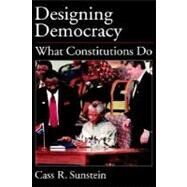Designing Democracy What Constitutions Do
, by Sunstein, Cass R.- ISBN: 9780195145427 | 0195145429
- Cover: Hardcover
- Copyright: 9/27/2001
We are in the midst of a period of dramatic new thinking, all over theworld, about the very nature of constitutionalism. This book makes a significantcontribution to the debate, providing a new understanding of the role of aconstitution in democratic life.Many nations face a pervasive problem of intense political disagreement--aproblem that threatens to create mutual misunderstanding. A major source of thetrouble, according to Sunstein, lies in deliberation amond like-minded people,which tends to produce extremism. A democratic constitution tries to ensure thatdiverse people are speaking to one another, and not hearing constant echoes oftheir own voices. The system of checks and balances is best understood in thislight--an idea with concrete implications for current dilemmas. Sunstein showshow a democratic constitution can promote social stability, and mutual respect,by making it possible for people to reach agreement where agreement isnecessary, and unnecessary to reach agreement where agreement is not possible. Agood constitution tries to allow people to agree on what to do even when theydisagree on why, exactly, they ought to do it.An understanding of these points helps illuminate many contested issues. Itexplains why a good democracy makes both impeachment and secession exceedinglyrare events. It also shows that a good constitution often opposes traditions,because traditions are frequently confused and oppressive. Traditionalism,Sunstein argues, is inconsistent with democratic values.Sunstein goes on to discuss issues of equality and discrimination, as well asthe relationship between sex equality and religious liberty. He also shows howjudges can promote democratic ideals by ensuring reason-giving, by promotingexposure to diverse views, and by prohibiting second-class citizenship.






